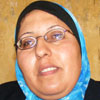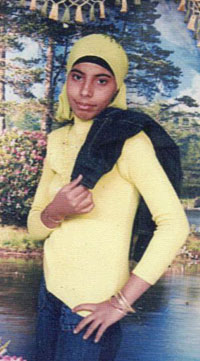Testimony: Young girl dies in Gaza after waiting two months for a permit to enter Israel for treatment
Amal Heji, 38

My brother’s daughter, Fidaa Talal Salim Heji, began to suffer from health problems around March 2007, when she was fifteen. Among other things, she lost a lot of weight, about twenty kilos in a month and a half. She was hospitalized in a-Shifaa Hospital, in Gaza City, where they found that her hemoglobin level was very low. She was referred to Nasser Hospital in Egypt, and her mother and I went with her. The physicians there found that she had cancer in her lymph nodes. She received chemotherapy there from 18 April to 28 May 2007. Her condition improved and we returned to Gaza, but a month later, it deteriorated again. She was pale, had trouble walking, and suffered dizzy spells. She couldn’t go to high school. Every time these symptoms worsened, we took her to the hospital, where she’d remain for a week or ten days.
 A year after we returned from Egypt, Fidaa began to receive chemotherapy treatments at a-Shifaa Hospital. Each time, they hospitalized her for twenty days. She was kept in isolation because her immune system was weak and it was important that she not catch other diseases or inhale germs. After each hospitalization, she went home. This continued until August 2009, when her condition deteriorated drastically. She was hospitalized in isolation and was given painkillers and antibiotics. Her weight dropped from one day to the next. The doctors referred her to Tel Hashomer Hospital (in Israel), where she could get better treatment and undergo a bone-marrow transplant. She was given an appointment there for 23 September 2009. On 10 September, I asked the Liaison Office to issue a permit for Fidaa and her mother to enter Israel, and I gave the officials all the necessary documents: the referral, confirmation of the appointment from Tel Hashomer, medical reports, and copies of their identity cards. More than a week afterwards, a Shabak [Israeli Security Agency] agent from Erez Crossing called to verify the details on the forms. After that conversation, I called the Liaison Office and I also went there. Rif’at Muheisen, the head, told me that the Israelis had not responded. We didn't think it would be a problem to get an entry permit because my niece was a young girl in a dangerous medical condition that required urgent attention. We waited, but the permit didn't come until the day of the appointment.
A year after we returned from Egypt, Fidaa began to receive chemotherapy treatments at a-Shifaa Hospital. Each time, they hospitalized her for twenty days. She was kept in isolation because her immune system was weak and it was important that she not catch other diseases or inhale germs. After each hospitalization, she went home. This continued until August 2009, when her condition deteriorated drastically. She was hospitalized in isolation and was given painkillers and antibiotics. Her weight dropped from one day to the next. The doctors referred her to Tel Hashomer Hospital (in Israel), where she could get better treatment and undergo a bone-marrow transplant. She was given an appointment there for 23 September 2009. On 10 September, I asked the Liaison Office to issue a permit for Fidaa and her mother to enter Israel, and I gave the officials all the necessary documents: the referral, confirmation of the appointment from Tel Hashomer, medical reports, and copies of their identity cards. More than a week afterwards, a Shabak [Israeli Security Agency] agent from Erez Crossing called to verify the details on the forms. After that conversation, I called the Liaison Office and I also went there. Rif’at Muheisen, the head, told me that the Israelis had not responded. We didn't think it would be a problem to get an entry permit because my niece was a young girl in a dangerous medical condition that required urgent attention. We waited, but the permit didn't come until the day of the appointment.
After that, I asked the Liaison Office to renew the request and make a new appointment with the hospital. Fidaa was given an appointment for 20 October, and on 29 September, I again submitted all the document s to the Liaison Office. Each time I spoke with Rif’at Muheisen, he said that the Israelis had not replied and had not completed the security check. Fidaa’s mother cried day and night. Fidaa looked terrible. Seeing her made us very sad. We continued to wait. The new time for the appointment passed too. We made another appointment, this time for 9 November. I submitted another request for an entry permit. We were tense and fearful and kept waiting. Each day, my niece’s condition got worse. Her weight dropped to about thirty kilos. She was connected to an inhalator and was hospitalized in isolation. She lived on antibiotics and painkillers.
On 11 November 2009, Fidaa died.
Four days later, on 15 November, an official from the Liaison Office called to tell me that the Israelis had approved Fidaa’s entry. We had hoped that Fidaa would be treated and get better. Maybe, if they had given her the permit in time, she would still be with us.
Amal Salim Muhammad Heji, 37, a resident of Gaza, is Fidaa Heji’s aunt. She was an officer in the President’s Guard in the Gaza Strip until the Hamas takeover. She gave her testimony to Muhammad Sabah at her home on 6 January 2010.

هیچ نظری موجود نیست:
ارسال یک نظر